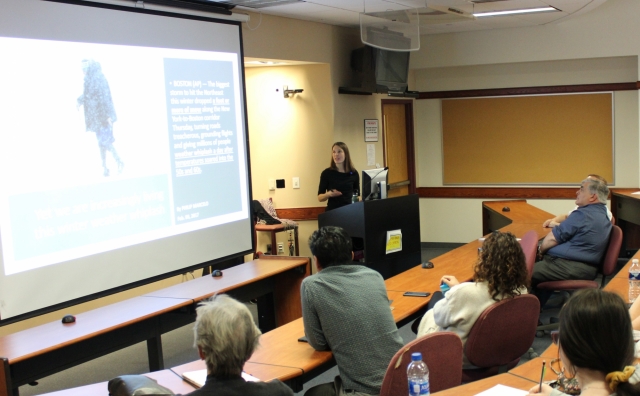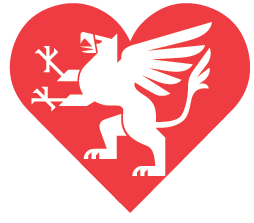 by Kathleen Dolan
by Kathleen Dolan
Alix Contosta, Ph.D., an ecosystem ecologist and a research assistant professor at the University of New Hampshire’s Earth Systems Research Center, recently delivered a lecture at Chestnut Hill College in which she said that extreme winter weather events are increasing to the detriment of natural and human systems.
Contosta, who spoke to students and members of the college community on Feb. 17 in Martino Hall, shared data and insight from a project she is co-leading at the University of New Hampshire that illustrates how the changing climate is contributing to “Winter Weather Whiplash.” The term, first introduced in a Washington Post article and later adopted by scientists, characterizes rapid reversals in winter weather and its effects on ecosystems and human communities. She is undertaking the project alongside members of several New England and Canadian universities.
“Winter weather whiplash is a type of compound extreme event,” Contosta wrote in an email. “Often when scientists and the public consider extreme events, they are usually thinking about heat waves, droughts, floods, heavy rains, not extreme winter weather.
“I hypothesize that we are living in a time when extreme winter weather events are increasing. We need to better understand these events in order to mitigate their risks.”
Researchers and scientists working on the project devised a specific definition to act as the framework for their research: a class of extreme events in which a collision of unexpected conditions produce a forceful, rapid, back-and-forth change in winter weather that in turn induces an unexpected impact on natural and human systems. The team also refers to something called “frigid winter,” a period of sustained temperatures below freezing that brings with it snow.
Contosta, who studies winter ecology and the winter-to-spring transition, explained that traditional winters are disappearing as there is an overall increase in warming trends. The winter weather whiplash events that she presented include heat waves and rain-on-snow events that occur within winter as well as cold snaps and snowstorms that happen outside of winter.
Contosta related these occurrences to everyday life as experienced by humans and nature. For example, if there is a snowfall outside of when it should normally occur, snowfalls on deciduous trees that have not yet shed their leaves can cause them to collapse under the weight of moisture. The impacts of this can reverberate across the natural system, throwing off nutrient cycles and affecting wildlife. The same event causes distress to human systems as falling trees can lead to widespread power outages.
Rain-on-snow events and early melting can have an impact on agriculture and recreation, wreaking economic loss on farms in the Midwest and on fruit orchards and ski resorts in New England, Contosta said. Water quality can suffer, too, she added, as floods can cause pollutants to enter water sources at high rates.
“People don’t think to go skiing when it’s warm outside,” she said of a winter heat wave.
Contosta has taught such courses as biogeosciences of the earth system, soil science, and soil ecology. She considers educating the public an integral part of her position.
“One of my goals as a scientist is to educate people about how our climate is changing, particularly the nuanced ways in which a changing climate system may impact our lives and the ecosystems upon which we depend,” she said. “I think a lot of us perceive climate change as a threat to people and places far away without realizing that climate change is happening on the ground, right now, in ways that impact both people and ecosystems.”







